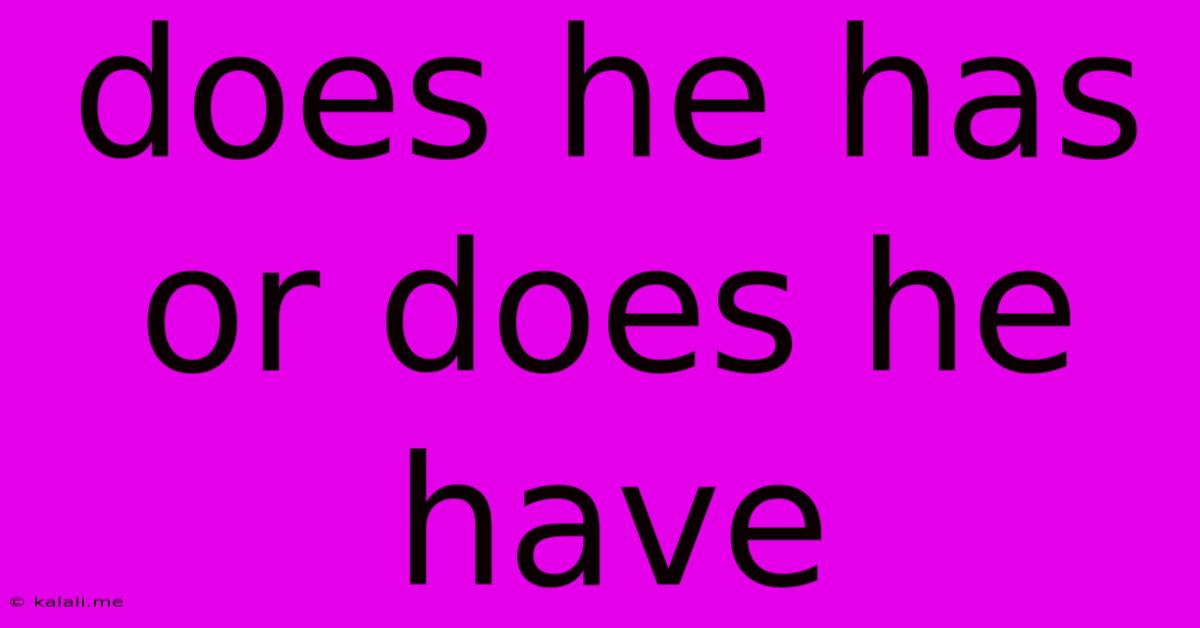Does He Has Or Does He Have
Kalali
May 20, 2025 · 2 min read

Table of Contents
Does He Has or Does He Have? Mastering This Common Grammar Conundrum
Choosing between "does he has" and "does he have" can be surprisingly tricky, even for native English speakers. This seemingly simple question highlights a fundamental grammatical concept: subject-verb agreement. This article will clarify the correct usage and help you avoid this common error. Mastering this will significantly improve your written and spoken English.
The correct phrase is "does he have". The reason lies in the auxiliary verb "does" and the nature of the verb "have."
Understanding the Role of Auxiliary Verbs
The word "does" is an auxiliary verb, also known as a helping verb. Auxiliary verbs are used to form different tenses and moods. In this case, "does" indicates the third-person singular present tense. This means it's used when talking about a single person (he, she, it) doing something in the present.
The Problem with "Does He Has"
"Has" is also a form of the verb "to have," but it's the third-person singular present simple form. Using both "does" and "has" creates a redundancy. The auxiliary verb "does" already incorporates the third-person singular present tense marker. Adding "has" makes the sentence grammatically incorrect and sounds awkward.
Think of it this way: "Does" already carries the information about the subject and tense. "He has" would be correct on its own (as in "He has a car"), but when combined with "does," it becomes superfluous.
Examples of Correct Usage:
- "Does he have a car?" This is the correct way to ask if he possesses a vehicle.
- "Does he have any questions?" This correctly inquires about his queries.
- "Does he have time to help?" This asks about his availability.
Common Mistakes and How to Avoid Them
The confusion often arises from the similar-sounding phrases. Remember, "does" is already covering the third-person singular present tense. Therefore, always follow "does" with the base form of the verb, which in this case is "have."
Avoid these common mistakes:
- Does he has gone? (Incorrect – should be "Has he gone?")
- Does he has eaten? (Incorrect – should be "Has he eaten?")
Expanding Your Understanding
Understanding subject-verb agreement is crucial for grammatical accuracy. This principle applies to other verbs and tenses as well. Practice using different auxiliary verbs and their corresponding verb forms to solidify your understanding. Paying close attention to the subject of your sentence (he, she, it, they etc.) and choosing the correct verb form to match will always lead you to grammatically sound sentences.
By mastering the distinction between "does he has" and "does he have," you'll significantly improve the clarity and correctness of your English. Remember, the correct phrase is always "does he have".
Latest Posts
Latest Posts
-
Quotations Before Or After Question Mark
May 20, 2025
-
Is Cream Cheese The Same As Cottage Cheese
May 20, 2025
-
How To Hang A Mirror Without Nails
May 20, 2025
-
Laying Stepping Stones Directly On Soil
May 20, 2025
-
How Do You Get A Dr Title
May 20, 2025
Related Post
Thank you for visiting our website which covers about Does He Has Or Does He Have . We hope the information provided has been useful to you. Feel free to contact us if you have any questions or need further assistance. See you next time and don't miss to bookmark.